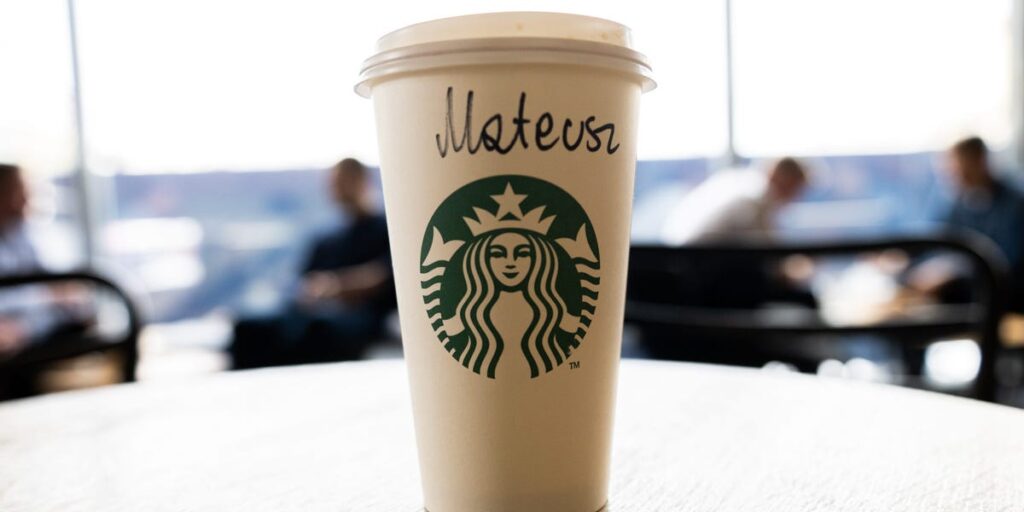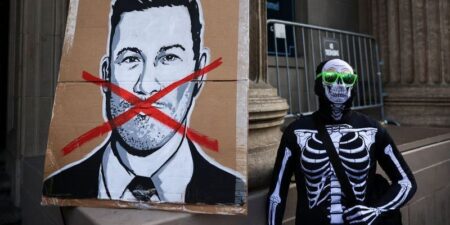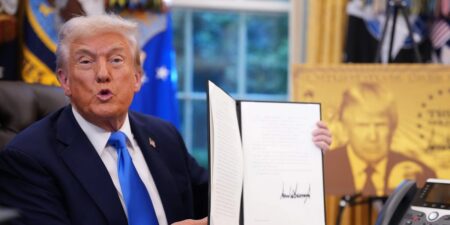The viral video of a Starbucks barista declining to put “Charlie Kirk” on a customer’s cup, citing corporate policy, has brought scrutiny to the company’s requirement that staff write on every beverage.
The mandate, intended to improve the customer experience, is a source of frustration for some baristas — because failing to do it, or writing the wrong thing, can have consequences.
Internal guidelines reviewed by Business Insider outline specific rules for notes and disciplinary guidelines for infractions. A serious infraction of the rules, like a profane message or repeatedly forgetting to mark a customer’s cup, can lead to termination.
“Starbucks prohibits the writing or printing of content on items that is inappropriate, offensive, or otherwise does not align with our Mission & Values,” a page from the Starbucks store operating manual reads.
“Partners should also not write or print content on items that advocates for a political, religious, or personal issue, even if requested by a customer.”
Business Insider spoke to 14 baristas from Starbucks stores across the country about the policy. They had varying interpretations of what notes are permitted under the company guidelines, and said that the enforcement of rules around cup notes has intensified in recent months.
“I have witnessed a couple of dozen verbal coachings, including me, because I didn’t catch two cups that the barista making the drinks forgot,” a Minnesota-based barista who has worked with Starbucks for seven years told Business Insider.
Starbucks declined to comment.
Discipline for not writing on cups — or writing the wrong thing
It’s not unusual for a company of Starbucks’ size — with more than 350,000 employees worldwide — to set clear standards for how staff should interact with customers and represent the brand. Businesses often have detailed rules with corresponding disciplinary structures to ensure consistency, efficiency, and a welcoming environment, particularly in large organizations where practices could otherwise vary widely across locations.
The guidelines reviewed by Business Insider indicate that “minor” rule infractions include not writing on every customer’s cup, using a pen other than a Sharpie to write a note, marking the lid of a cup, or pre-marking cups before a customer places their order.
Medium infractions include writing pop culture or political references, drawings of animals, or generational slang.
“They say no animals, because it might be taken the wrong way. But when kids would come in, I used to write a little cat or a dog on their cup and, you know, they loved it,” a barista in California told Business Insider. “Now I can’t do that anymore. I might get written up.”
Serious violations of the rule are those that would likely violate other store policies or offend a reasonable person — like a barista writing “Diabetes here I come!” on a customer’s order.
Following the video of the barista declining to put Kirk’s name on a cup after the conservative activist was murdered, Starbucks clarified that the company does not restrict what names customers can request on their orders, even if the name is political. Any other political messaging remains prohibited.
“We aim to be a community coffeehouse where everyone feels welcome, so we have previously provided guidance to our partners to respectfully ask the customer to use a different name when attempting to use political slogans or phrases in place of their name,” Starbucks said Wednesday. “We are clarifying with our team now that names, on their own, can be used by customers on their café order, as they wish.”
According to the guidelines reviewed by Business Insider, the first warning for a minor infraction, so long as a barista has had appropriate training and received no other recent corrective action, is verbal coaching. A second warning leads to a write-up. A third and final warning is issued before termination upon a fourth infraction.
Medium offenses automatically receive a written warning, and serious violations receive a final written warning upon their first offense.
The guidelines show that if a staff member makes a minor or medium infraction and has received a final written warning any time in the last year for any reason, they will be terminated from the company. Automatic termination may also occur if the infraction is so severe that a reasonable person would be “highly offended,” such as a profane or lewd remark.
But, as with many corporate rules across companies, whether a barista is getting a verbal or written warning could depend on their manager and their interpretation of the guidelines, six baristas told Business Insider.
“My manager is more understanding, like, she’s actually working with us,” a California-based barista who has been at the company for a year, told Business Insider. “A lot of managers, when I’ve worked in other stores, don’t really work with the employees and just kind of sit in the back and wait for you to mess up.”
Three baristas told Business Insider they’ve seen fellow staff members be fired or quit this year over the cup note policy.
An attempt at customer connection
Starbucks’ cup writing guidelines were implemented as part of the company’s “Back to Starbucks” campaign. In the company’s Q3 earnings report, CEO Brian Niccol said that employee engagement and customer connection scores have improved since the new customer service standards were rolled out.
In a memo to staff, previously reported by Business Insider, Niccol described the return of cup notes — which were more prominent on Starbucks orders before the company began using printed order stickers nearly a decade ago — as part of his effort to bring “meaningful” moments back to customers’ days.
Michelle Eisen, a spokesperson for the Starbucks Workers United union and a 15-year barista veteran, told Business Insider that when she began at the company, the handwritten notes were used so that the barista knew what beverage to make. Once order stickers started being used, she said the company did “lose some of the personality” that made it popular.
Eisen said that mandating baristas to write on every cup without exception makes the job harder, especially during peak hours, when staff attempt to get drinks in customers’ hands in under four minutes. She said that the threat of discipline removes the chance for meaningful connection with customers since baristas are only writing the notes “under duress.”
“There’s no sincerity in that,” Eisen said. “Now you’ve got a manager staring you down while you’re making drinks to make sure you stop in between every single drink to write some sort of message with a Sharpie. It’s only increasing wait times, and it is not helping with just the overall environment within these stores.”
Michael Goldberg, a professor of entrepreneurship and finance at Case Western Reserve University’s Weatherhead School of Management, previously told Business Insider that Starbucks’ policy is an example of a company rule that aims to better connect the business with its customers but is tough to roll out at the individual or store level.
The increased visibility around the viral incidents, Goldberg said, behooves Starbucks executives to consider the question: “How committed are you to doing these notes? Because I think they’re just going to keep having these moments of tension.”
Have a tip? Contact this reporter via email at Katherine Tangalakis-Lippert at [email protected] or Signal at byktl.50. Use a personal email address, a nonwork WiFi network, and a nonwork device; here’s our guide to sharing information securely.
Read the full article here
















